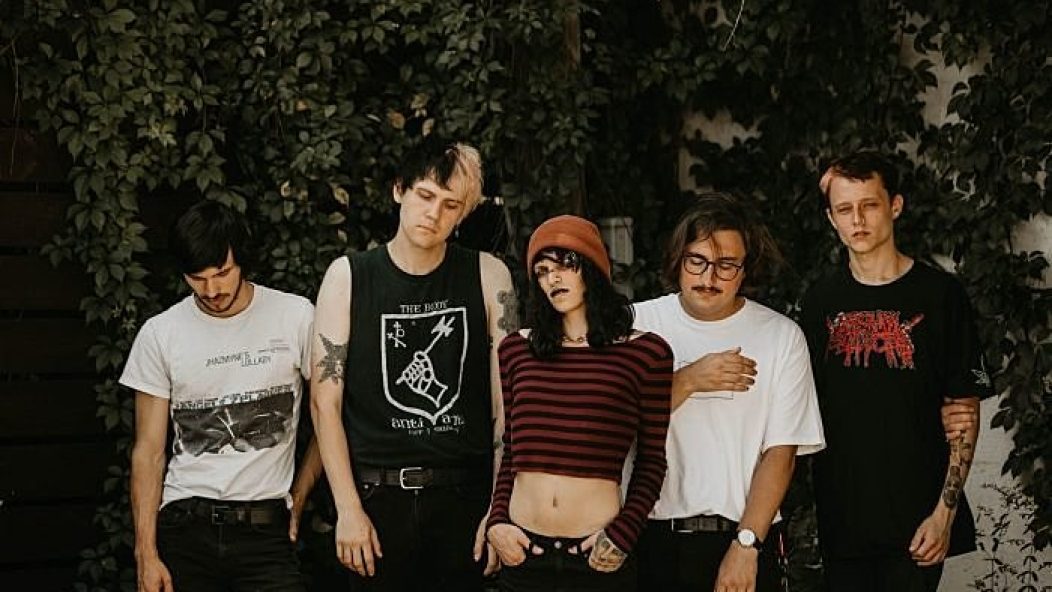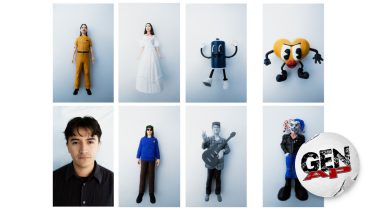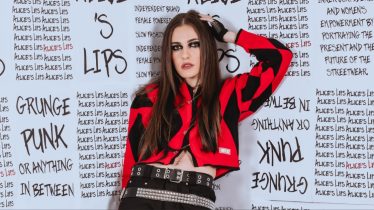
SeeYouSpaceCowboy on destroying the stigma of addiction with their new LP
Unquestionably, metalcore and its associated subgenres have traditionally been masculine. Even in the way we describe the music, with “brutal” screams and “savage” breakdowns, the metal lexicon occasionally can make it challenging for someone with an alternative gender identity. While we’ve seen a gradually increasing inclusion of female and nonbinary artists breaking the mold for the LGBTQIA+ community, the disparity is far from overcome. With the help of San Diego sasscore shape-shifters SeeYouSpaceCowboy and their vocalist Connie Sgarbossa, all that can change.
Raised in the macho worlds of punk and hardcore, Sgarbossa initially identified as nonbinary and ultimately discovered her femininity in the open realms of screamo and eventually sasscore, a comfortable home where artists can express a wide range of emotions, both on track and onstage. Since their inception in 2016, SeeYouSpaceCowboy’s musical and lyrical content has embodied that freedom, ranging from satirical swipes at political issues to empowering, anthemic numbers.
Read more: 20 greatest Roadrunner Records bands, from Slipknot to Turnstile
Where the outfit’s 2019 effort, The Correlation Between Entrance And Exit Wounds, put forward a message of support to listeners struggling through hard times, their new album, The Romance Of Affliction, turns introspective and tracks Sgarbossa and her bandmates’ toughest life experiences, particularly addiction. With stark depictions of the battles others only dare to portray when they’re clean, Sgarbossa’s blistering honesty speaks from the heart of someone still battling their demons to this day.
Bringing members from their original lineup back into the fold, SeeYouSpaceCowboy rejuvenate their purpose and unique instrumental approach to take the difficulties of the last two years and drag them into the cold light of day.
Metalcore is always depicted in masculine terms like “guttural” and “vicious.” So much that there’s no room for femininity in the way we describe or create in this genre. How do you feel about changing that and opening up the genre to finally accept the feminine?
I see a lot of women in metalcore starting to get the spotlight, but that’s why I gravitated so much towards white belt and sass because they were more feminine. There was less tough guy stuff but with men doing femininity instead. As time goes on, I’ve learned to reappreciate the aggression and masculinity again. I’ve learned to exist in that masculine place as a woman. When I first came out, I thought I had to be very feminine and that was the only way society was ever going to accept me, but I realized that I still wanted to be me and do the things I like. Why can’t I do those things as a woman?
I feel like there’s a lot of pressure for most trans women to be hyper-feminine and almost use drag queens as the example to push femininity as hard as you can — I’ve just rejected that. I’m a tomboy, and nothing’s changed in me that made me not like the things I liked before. I’m just a different gender. It’s a weird thing to talk about because I almost don’t feel like I can fully connect with a lot of the queer and trans scene because everybody plays into this caricature that I don’t belong to.
I wanted to help other people who might not identify with that stereotype and mainstream queer culture. I realized that you don’t have to fit in that box if you don’t want to. It doesn’t make you any less valid to not do these things, to not have a very high feminine voice, to not get a crazy $15 cocktail at the gay bar every weekend. You can be gay and sit with your homies and watch music videos!
The new album’s called The Romance Of Affliction. What does that title mean to you, and what does it tell us about what we can expect to hear from the music?
To me, the title is a double-edged sword. On one hand, it’s my way of critiquing how we romanticize and almost mythologize things like struggle, drug addiction and death because we tend to look at them and think they’re romantic in a sense. That was one meaning that I really wanted to hammer in as a critique of that because the things that seem to resonate with people the most are death, destruction and all these terrible things, but it’s not taken as a warning or something to acknowledge; it’s taken as something romantic. The other side of it is the literal interpretation.
The album is all about my personal struggles with drug addiction and the unhealthy ways I’ve masked my feelings of grief and mental illness. I’ve masked it all with sex and substances. It touches on what it means to be an addict and how it affects your relationships, what it means to be an addict in love with an addict, so it’s also that literal interpretation of what this album is to me — the romance of affliction is what it is to be in love with struggle and being intertwined as much as possible.
What’s changed musically over the unusual two years since The Correlation Between Entrance And Exit Wounds?
The main thing that changed is when quarantine hit, we lost our main songwriter, and a lot of our members left. Ethan [Sgarbossa] got promoted to main songwriter, and we brought back old members of the band. Our original guitarist Taylor Allen is now our bassist and singer. We have our guitarist Timmy Moreno from our early days, and we brought in our new drummer, our friend AJ Tartol. A lot changed because we have a whole new team, and we wanted to come at it from a different point of view, almost back to how we started the band, which was like throwing everything we want in a blender and making it work.
It was really cool to show them how far the band we started had come while they were gone, so let’s keep pushing it forward now [that] they’re back. We wanted to take what we did on Correlation, all the emotional, sad stuff, but also bring back the sassy and weird [elements] that we felt was SeeYouSpaceCowboy. We also wanted to imbue this sense of melody and singing, so it was basically an experiment to see if we could make it all work.
It was the first album we’ve written that was truly a team effort. We wrote 30 songs and wrote every single one together by working through them meticulously when we met up. It was a huge collaborative thing for once, and it was a great reunion to help rejuvenate what we wanted to do with the band and gave us the means to do it — it felt like SpaceCowboy again way back when we first started as me, Ethan and Taylor.
Which song on the album means the most to you personally?
Every song means a lot to me, but the one that means the most is the end track, “The Romance Of Affliction.” It’s really cool to me because Taylor wrote all his lyrics for it, so it’s him talking about his experiences and me talking about mine. They intertwine with each other so well, and I think it makes a really powerful way to end the record.
It’s about something that’s so prevalent in my life, what it means to be someone who’s a drug addict with another drug addict, when you’re trying to help each other, but you’re also struggling so much yourself and how it really affects you both. It ends on the note of me basically telling them not to let me bring you down. If I don’t get any better, then just leave me. That song was really hard to put in there and process and accept because you want to hold on to the people you love, but you have to come to a point where you need to tell them, “Go on without me if I don’t get better.”
Your music has always been deeply thought-provoking in both a serious and satirical manner. When people hear the new album for the first time, how do you want them to feel? Do you want your lyrics to move people or change how they feel?
I don’t necessarily have an expectation of how I want people to take this record since it acts so much as a diary and a confession than any other album. I hope people get some catharsis and resonate with it in a way, but at the same time, these are experiences that are so specific to me.
To an extent, but not in an asshole kind of way, I don’t really care that much because this was something I did just for myself, particularly because I’m writing about parts of myself that I don’t like or things I’ve done that aren’t cool or writing about extremely personal things like overdosing only to then overdose and almost die two weeks after recording it. These are not good parts of me, so I don’t necessarily want people to identify with them, but if they do and it serves them in some way, then that’s only a positive thing.
Read more: 20 nü-metal bands that defined the late ’90s and early 2000s
During the aftermath of this album and overdosing, I’ve been trying to be way more open about things. Of course, the album is extremely confessionary, but also writing out things like when I announced to the world that I almost died weeks before, I overdosed twice and had to get Narcan on my couch. I want to be more open about addiction because I want to destroy that stigma and the view of what it means to be an addict.
Everybody seems to have an innate negative perception, and that makes me want to be more honest about it. I’m an addict. I’m addicted to opiates, cocaine and I’m an alcoholic. I’ve gone clean; I’ve relapsed — I’ve gone through the whole process so many times. I want to be that voice because I feel like there’s not enough people out there talking about it; everybody wants to talk about it when it’s over and done or when you die, but I want to talk about this as the process I’m going through right now, not when I get out of rehab.
This interview appeared in issue 400, available here.






